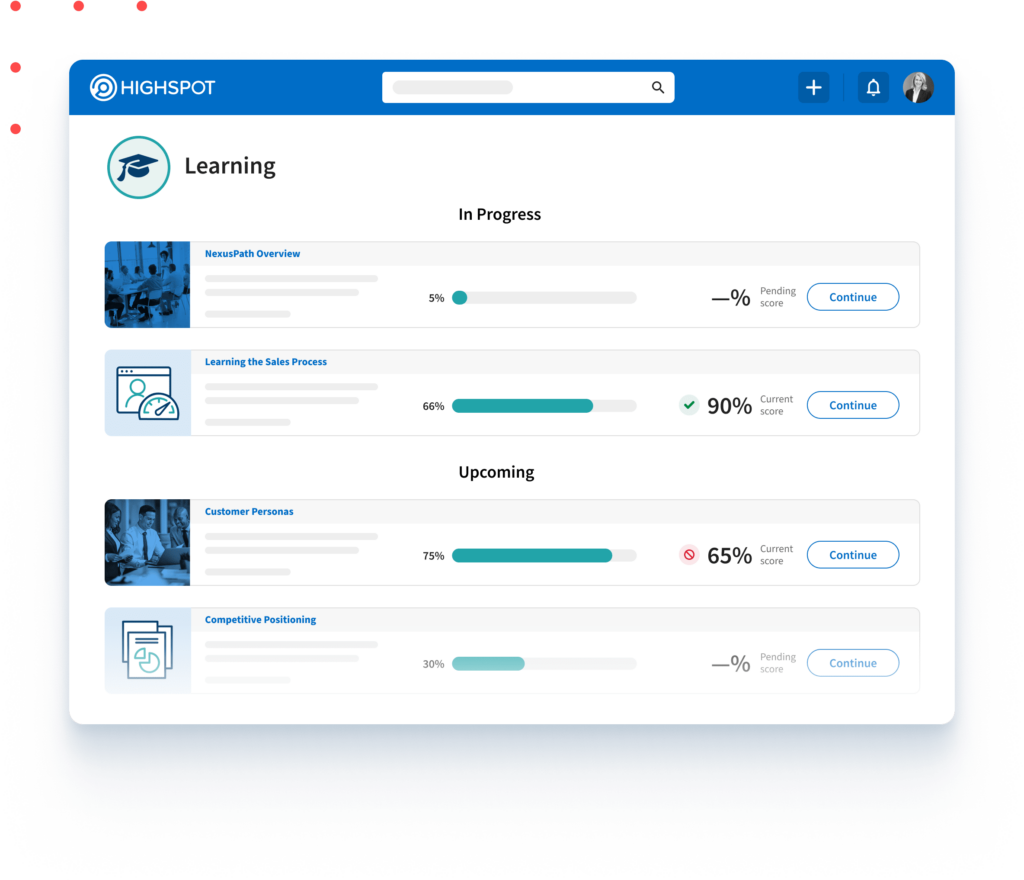Highspot für Technologie
Unterstützen Sie Sales Enablement-Teams mit KI-gestützten Tools
Vertrieb optimieren. Produktivität maximieren. Deals schneller abschließen.

Führende Technologieunternehmen vertrauen uns:
Umsatzwachstum mit strategischem Sales Enablement beschleunigen
Ein effektives Sales Enablement-Programm versetzt Ihre Vertriebsteams in die Lage, dem wirtschaftlichen Gegenwind zu trotzen, die sich wandelnden Kundenerwartungen zu erfüllen und die Konkurrenz zu übertreffen. Mit Highspot stellen Sie Ihren Vertriebs- und Marketingteams die Tools, Schulungen und Ressourcen bereit, mit denen sie intelligenter und schneller arbeiten können, um die Vertriebszyklen zu verkürzen, hochwertige Kundenerfahrungenzu schaffen und die Rentabilität zu steigern.

Inhalte mühelos verwalten

Moderne Buyer Experience bieten

Verkäufer befähigen, mehr zu verkaufen
Vertriebsmitarbeiter mit den richtigen Inhalten zur richtigen Zeit ausstatten

Die Wirtschaft ändert sich rasant. Mit Content Management helfen Sie Ihrem Team, Schritt zu halten. In Highspot finden, teilen und analysieren Vertriebsmitarbeiter problemlos Inhalte, während Sales Enablement und Marketing eine beispiellose Zusammenarbeit für bessere Geschäftsergebnisse ermöglichen.
- Kontextbezogene Inhaltsempfehlungen, einschließlich E-Mail-Vorlagen, Buyer-Persona-Botschaften und mehr, in anpassbaren Sales Plays und Playbooks bündeln
- Reduzierung des Zeitaufwands für die Suche nach Sales Enablement-Inhalten mit KI-gestützter Suche und geführten Browsing-Erlebnissen
- Inhalte überall anbieten, ob per E-Mail, Slack oder LinkedIn
- Entwicklung einer datengestützten Go-to-Market Strategie zur Vereinheitlichung der Vertriebs- und Marketinginitiativen
- Nutzung von Analytik zur Auswertung von Unterbrechungen im Verkaufstrichter und Optimierung von B2B-Marketinginhalten
Mehrwert an jedem Berührungspunkt im Kaufprozess bieten
Erstellen Sie mit unserer Sales Enablement Software die Buyer Experience, die Ihre B2B-Kunden erwarten. Mit der Buyer Engagement Suite kann Ihr Vertrieb lösungsorientierte Inhalte erstellen und Käufer mit digitalen Verkaufsräumen beeindrucken. Verwandeln Sie qualifizierte Leads in erfolgreiche Geschäftsabschlüsse.
- Schnelles Erstellen digitaler Verkaufsräume und Teilen über diverse Kanäle, einschließlich E-Mail oder Social Media
- Personalisierung von Inhalten für alle Mitglieder des Einkaufsausschusses – von Entscheidungsträgern bis zu Champions
- Automatische Verknüpfung von Kundenengagement und Opportunities in Ihrem Customer Relationship Management-System (CRM)
- Anpassen des Follow-ups anhand von Aktivitätsmetriken und KPIs des Käufers

Besseres Vertriebstraining, Onboarding und Coaching erstellen

Highspots Sales Enablement Tool ermöglicht allen Mitglieder des Vertriebsteams Pipeline zu erstellen, Käufer anzusprechen, Ihre Botschaft zu vermitteln und Deals abzuschließen. Dadurch werden Verkäufer befähigt, den Käufer zu unterstützen und die Komplexität von Kaufentscheidungen zu verringern.
- Schnelles Verfassen von Lektionen und Kursen mit Vorlagen und Drag-and-Drop-Editor.
- Erstellen Sie personalisierte, autonome Kurse mit Lernpfaden und Zertifizierungen.
- Relevante Vertriebsschulung in Sales Playbooks und Plays
- Robuste Analyse zur Überprüfung und Optimierung von Lernfortschritten
- Verstärkung von Onboarding und Schulungen am Arbeitsplatz zur Verbesserung der Wissensbewahrung
- Befähigung von Vertriebsleitern zur effektiveren Überwachung und Betreuung
Wichtige Funktionen zur Verbesserung und Automatisierung Ihrer Vertriebsabläufe
KI-gestützte Anleitung und Einblicke
Nutzung von KI und Automatisierung, um gezielte Inhalte, Anleitungen und Wissen zur richtigen Zeit bereitzustellen und zu analysieren, was bei Werbematerialien, Schulungen und Kundenbindung gut funktioniert, und die Erkenntnisse unternehmensweit zu nutzen.
Umsetzbare Analytik
Klare Einblicke in Ihre Sales Enablement-Strategie, einschließlich der Akzeptanz durch Vertriebsmitarbeiter, Leistung bei der Markteinführung und des Kundenengagement, damit Vertriebsleiter erkennen können, was funktioniert und wo schnelle Maßnahmen zur Optimierung ergriffen werden müssen.
Nahtlose Integrationen
Erweitern Sie das Potenzial Ihres Technologie-Stacks. Integrieren Sie Sales Enablement direkt in den bestehenden Workflow Ihrer Vertriebsmitarbeiter mit Highspots Ökosystem von über 100 Integrationen.

Sicherheit und Compliance
Schützen Sie Ihre Inhalte und Daten durch die unternehmensweite Plattformsicherheit.
Mit personalisierten Einstellungen können Sie die Freigabe von Inhalten steuern und Compliance-Funktionen sorgen dafür, dass Sie die jeweiligen gesetzlichen und branchenspezifischen Standards einhalten.



